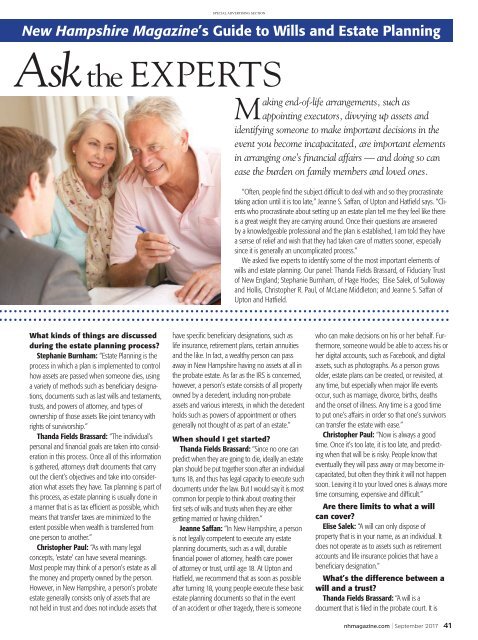New Hampshire Magazine September 2017
Create successful ePaper yourself
Turn your PDF publications into a flip-book with our unique Google optimized e-Paper software.
SPECIAL ADVERTISING SECTION<br />
<strong>New</strong> <strong>Hampshire</strong> <strong>Magazine</strong>’s Guide to Wills and Estate Planning<br />
Ask the EXPERTS<br />
Making end-of-life arrangements, such as<br />
appointing executors, divvying up assets and<br />
identifying someone to make important decisions in the<br />
event you become incapacitated, are important elements<br />
in arranging one’s financial affairs — and doing so can<br />
ease the burden on family members and loved ones.<br />
“Often, people find the subject difficult to deal with and so they procrastinate<br />
taking action until it is too late,” Jeanne S. Saffan, of Upton and Hatfield says. “Clients<br />
who procrastinate about setting up an estate plan tell me they feel like there<br />
is a great weight they are carrying around. Once their questions are answered<br />
by a knowledgeable professional and the plan is established, I am told they have<br />
a sense of relief and wish that they had taken care of matters sooner, especially<br />
since it is generally an uncomplicated process.”<br />
We asked five experts to identify some of the most important elements of<br />
wills and estate planning. Our panel: Thanda Fields Brassard, of Fiduciary Trust<br />
of <strong>New</strong> England; Stephanie Burnham, of Hage Hodes; Elise Salek, of Sulloway<br />
and Hollis, Christopher R. Paul, of McLane Middleton; and Jeanne S. Saffan of<br />
Upton and Hatfield.<br />
What kinds of things are discussed<br />
during the estate planning process?<br />
Stephanie Burnham: “Estate Planning is the<br />
process in which a plan is implemented to control<br />
how assets are passed when someone dies, using<br />
a variety of methods such as beneficiary designations,<br />
documents such as last wills and testaments,<br />
trusts, and powers of attorney, and types of<br />
ownership of those assets like joint tenancy with<br />
rights of survivorship.”<br />
Thanda Fields Brassard: “The individual’s<br />
personal and financial goals are taken into consideration<br />
in this process. Once all of this information<br />
is gathered, attorneys draft documents that carry<br />
out the client’s objectives and take into consideration<br />
what assets they have. Tax planning is part of<br />
this process, as estate planning is usually done in<br />
a manner that is as tax efficient as possible, which<br />
means that transfer taxes are minimized to the<br />
extent possible when wealth is transferred from<br />
one person to another.”<br />
Christopher Paul: “As with many legal<br />
concepts, ‘estate’ can have several meanings.<br />
Most people may think of a person’s estate as all<br />
the money and property owned by the person.<br />
However, in <strong>New</strong> <strong>Hampshire</strong>, a person’s probate<br />
estate generally consists only of assets that are<br />
not held in trust and does not include assets that<br />
have specific beneficiary designations, such as<br />
life insurance, retirement plans, certain annuities<br />
and the like. In fact, a wealthy person can pass<br />
away in <strong>New</strong> <strong>Hampshire</strong> having no assets at all in<br />
the probate estate. As far as the IRS is concerned,<br />
however, a person’s estate consists of all property<br />
owned by a decedent, including non-probate<br />
assets and various interests, in which the decedent<br />
holds such as powers of appointment or others<br />
generally not thought of as part of an estate.”<br />
When should I get started?<br />
Thanda Fields Brassard: “Since no one can<br />
predict when they are going to die, ideally an estate<br />
plan should be put together soon after an individual<br />
turns 18, and thus has legal capacity to execute such<br />
documents under the law. But I would say it is most<br />
common for people to think about creating their<br />
first sets of wills and trusts when they are either<br />
getting married or having children.”<br />
Jeanne Saffan: “In <strong>New</strong> <strong>Hampshire</strong>, a person<br />
is not legally competent to execute any estate<br />
planning documents, such as a will, durable<br />
financial power of attorney, health care power<br />
of attorney or trust, until age 18. At Upton and<br />
Hatfield, we recommend that as soon as possible<br />
after turning 18, young people execute these basic<br />
estate planning documents so that in the event<br />
of an accident or other tragedy, there is someone<br />
who can make decisions on his or her behalf. Furthermore,<br />
someone would be able to access his or<br />
her digital accounts, such as Facebook, and digital<br />
assets, such as photographs. As a person grows<br />
older, estate plans can be created, or revisited, at<br />
any time, but especially when major life events<br />
occur, such as marriage, divorce, births, deaths<br />
and the onset of illness. Any time is a good time<br />
to put one’s affairs in order so that one’s survivors<br />
can transfer the estate with ease.”<br />
Christopher Paul: “Now is always a good<br />
time. Once it’s too late, it is too late, and predicting<br />
when that will be is risky. People know that<br />
eventually they will pass away or may become incapacitated,<br />
but often they think it will not happen<br />
soon. Leaving it to your loved ones is always more<br />
time consuming, expensive and difficult.”<br />
Are there limits to what a will<br />
can cover?<br />
Elise Salek: “A will can only dispose of<br />
property that is in your name, as an individual. It<br />
does not operate as to assets such as retirement<br />
accounts and life insurance policies that have a<br />
beneficiary designation.”<br />
What’s the difference between a<br />
will and a trust?<br />
Thanda Fields Brassard: “A will is a<br />
document that is filed in the probate court. It is<br />
nhmagazine.com | <strong>September</strong> <strong>2017</strong> 41





